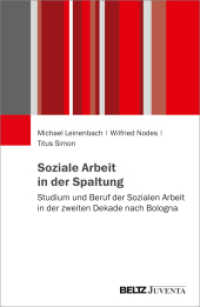- ホーム
- > 洋書
- > 英文書
- > Politics / International Relations
Full Description
How could an undemocratic regime manage to stabilise Russia? What is Putin's success formula? What are the symbolic and diskursive underpinnings of Russia's new stability? Many outside observers of Russia regarded the authoritarian tendencies during the Putin presidency as a retreat from, or even the end of, democratisation. Rather than attempting to explain why Russia did not follow the trajectory of democratic transformation, this book aims to attain an understanding of the stabilisation process during Putin's tenure as president. Proceeding from the assumption that the stability created under Putin is multi-layered, the authors attempt to uncover the underpinnings of the new equilibrium, inquiring especially about the changes and fixations that occurred in the diskourses on political and national identity. In doing so, the authors analyse the trajectories of the past years from the traditional perspective of transitology as well as through the lens of post-structuralist diskourse theory. The two approaches are seen as complementary, with the latter focusing less on the end point of transition than on the nature of the mechanisms that stabilise the current regime. The book therefore focuses on how nationalism became an increasingly important tool in political diskourse and how it affected political identity. "Sovereign democracy" is seen by many contributors as the most explicit manifestation of a newfound post-Soviet identity drawing on nationalist ideas, while simultaneously appeasing most sectors of the Russian political spectrum.
Contents
About the Authors Acknowledgments Foreword by H. Haumann Introduction I. Discourses in Russian Politics II. Regime Type and National Identity III. Sovereign Democracy and its Competitors IV. Symbols and the Past V. Outside Perspectives Index







